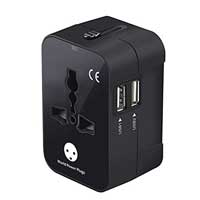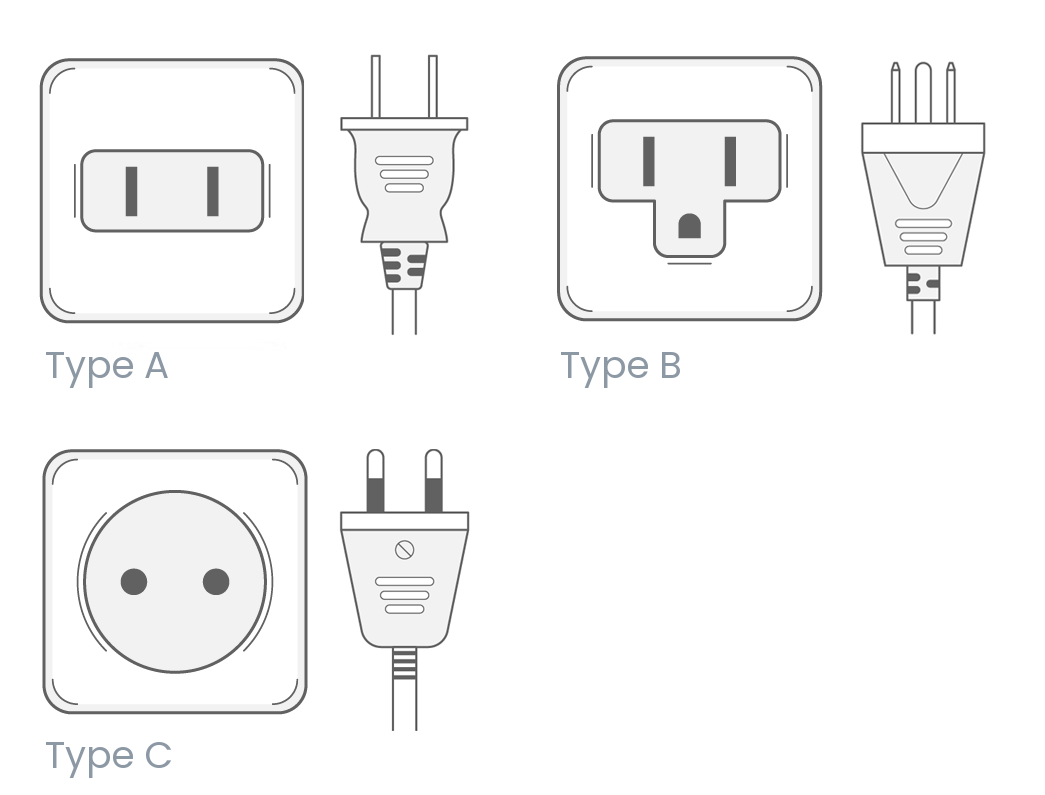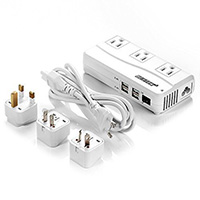Philippines electrical outlets & plugs
Check if you need a power plug adapter
Do I need a power adapter for Philippines?
Philippines uses power outlets and plugs of types A, B & C. Take a look at the pictures below to see what these plugs and power sockets look like:
Doesn't look familiar?
Do the outlets look different in your country? You'll need a power plug adapter.

Click for adapter Philippines
-
Type A - Mostly used in the US, Canada, Mexico, Central America, China and Japan. No other plug types will fit in a type A outlet.
-
Type B - Similar to type A, but with an extra pin for grounding. Mainly used in the US, Canada, Mexico, Central America and Japan. Plugs of type A will also fit into a type B socket.
-
Type C - The standard European plug. Commonly used in Europe, South-America and Asia, but also in quite a few other countries. Plugs of type E and F will also fit in a type C outlet.
Most electrical outlets in the Philippines are non-grounded two-pronged outlets of either type A (North-American standard) or type C (European style). Power outlets rarely accept both types of plugs. If you have a US three-pin plug (type B), you will need an adapter to plug in to non-polarized, two-pin outlets.
Electricity in Philippines - voltage and frequency
All power sockets in Philippines provide a standard voltage of 220V with a standard frequency of 60Hz.
You can use all your equipment in Philippines if the outlet voltage in your own country is between 220V-240V. This is the case in most of Europe, Australia, the United Kingdom and most countries in Africa and Asia.
If the standard voltage in your country is in the range of 100V-127V (which is most common in the US, Canada and countries in South America) you might need a voltage converter in Philippines.
The standard frequency in Philippines is 60Hz. If this frequency differs from the frequency used in your home country, please use caution when plugging in your devices. Check the small print on the device to see if the device can handle the frequency. Please note we regularly check our electricity information with the International Electrotechnical Committee (IEC)
Small print on the device or power adapter indicates what voltages the device can work with. If you see 100-240V 50/60Hz printed, the adapter is rated to work on all voltages used worldwide. Please note that power plug adapters only convert plug types and do not convert voltages.
Frequently asked questions
Below are the answers to some of the most frequently asked questions about Philippines outlets and power plugs:
Are Philippines electrical outlets the same as the US?
Yes, the electrical outlets in Philippines are the same as in the United States, both countries use power plugs and electrical outlets of types A and B. However, the voltage and/or frequency used in Philippines is not the same as in the United States, so you may need a voltage converter.
Do I need a travel adapter for Philippines?
The electrical outlets and power plugs in Philippines are of types A, B & C (see images). If your country uses the same electrical outlets and power plugs, you don't need a travel adapter. However, you may still need a voltage converter if the voltage is different. Are the electrical outlets and power plugs in Philippines different than the ones used in your country? In that case you do need a travel adapter.
Not sure whether the outlets and plugs used in your country are the same as in Philippines? Use the tool at the top of this page to check if you need a power plug adapter.
Do I need a voltage converter for Philippines?
The voltage used in Philippines is 220V and the frequency is 60Hz. If this is the same in your own country, you don't need a voltage converter when travelling to Philippines. If the voltage and/or frequency in your country is different, you should check if your devices are dual voltage. Nowadays, many electronic devices like hair styling tools or chargers for a laptop, phone, iPad, tablet or e-reader are dual voltage, but you should always double check this before using the device in another country.
You should be able to check the small print on a device or power adapter to see if it's dual voltage or not. If you see 100-240V 50/60Hz printed on the device or power adapter, it is dual voltage and will work with all voltages and frequencies used worldwide.
If your device or power adapter is not dual voltage or you are unsure, and the voltage and/or frequency in Philippines differs from your own country, you should use a voltage converter when plugging in your devices and power adapters in Philippines.
What power plug types and electrical outlets are used in Manila?
What's the difference between a travel adapter and a voltage converter?
A travel adapter is a device that allows you to plug your electronic devices into electrical outlets in foreign countries where the plug type is different. It does not change the voltage of the electricity.
A voltage converter, on the other hand, is a device that converts the voltage of the electricity from one level to another. It is necessary when you are traveling to a country with a different voltage than what your device is designed for. For example, if you are traveling from the United States (where the voltage is 110-120V) to Europe (where the voltage is 220-240V), you would need a voltage converter to use your 110V devices.
It is important to note that some electronic devices, such as laptops and smartphones, are dual voltage, which means they can handle both 110V and 220V. In this case, you would only need a travel adapter and not a voltage converter. It is always a good idea to check the voltage requirements of your electronic devices before travelling to a foreign country.
How do I know if my electrical device is dual voltage?
You should be able to check the small print on an electrical device or power adapter to see if it's dual voltage or not. If you see 100-240V 50/60Hz printed on the device or power adapter, it is dual voltage and will work with all voltages and frequencies used worldwide. If you can't find this information on the device or power adapter itself, you can maybe find it in the manual or by contacting the manufacturer of the device.
Can I charge my iPhone, Android phone or other smartphone in Philippines?
Chargers for iPhones, Android phones and other smartphones or cell phones are usually dual voltage, so you can use them all over the world. However, it is possible you'll need an adapter to plug the charger into a Philippines outlet.
Philippines uses electrical outlets and power plugs of types A, B & C (see images). If your country uses the same electrical outlets and power plugs, you don't need a travel adapter. Are the electrical outlets and power plugs in your country different? Then you will need a travel adapter.
Not sure whether the outlets and plugs used in your country are the same as in Philippines? Use the tool at the top of this page to check!
Can I connect my laptop charger to an electrical outlet in Philippines?
Yes, you can connect your laptop charger to an electrical outlet in Philippines as long as the outlet is compatible with the charger's voltage and plug type.
In Philippines, the standard voltage is 220V and the standard frequency is 60Hz. Most laptop chargers are designed to be compatible with a range of voltages (dual voltage), so they should work with outlets in Philippines without any issues. But you should always double check the voltage requirements of your laptop charger before using it in another country.
However, you may need to use a power plug adapter to fit the charger's plug into the outlets used in Philippines. Use the tool at the top of this page to check if you need a power plug adapter when travelling to Philippines.
Can I use my hair dryer, hair straightener or curling iron in Philippines?
Whether you can use your favorite hair tools like a hair dryer, hair straightener or curling iron in Philippines or not depends on the type of power plug your device has and if it's compatible with the voltage and frequency used in Philippines. In Philippines electrical outlets and plugs of types A, B & C are used (see images). You can check if these are the same as in your country with the tool at the top of this page.
The voltage used in Philippines is 220V with a frequency of 60Hz. If the voltage and/or frequency in your country is different, you may need a voltage converter if your hair dryer, hair straightener or curling iron is not compatible with this.
However, travel adapters and voltage converters do not always work well with devices that need a lot of power such as a hair dryer, hair straightener or curling iron, which can be dangerous to use with these devices. So a safer option would be to purchase a travel specific dual voltage hair dryer, hair straightener or curling iron that will work all over the world. This way you'll avoid the need for a voltage converter altogether. Besides, these small and compact travel devices are also easier to take with you when travelling.
Click here for dual voltage travel hair dryers on Amazon.

